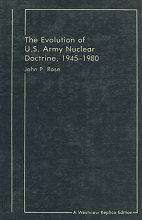
ROSE : The evolution of U.S. Army nuclear doctrine (előszó)
Winston Churchill understood tanks. The theory on how to use tanks in a rapid assault motion was an innovation of General Charles de Gaulle. When one thinks of the operational use of tanks in combat it was the German army's blitzkrieg tactics that prevailed. So it wasn't to the inventor or the theorist but to the one that operationalized the concept that the greatest advantage accrued. Thus it may be with nuclear weapons and nuclear combat. The United States well understands the technical aspects of the weapons and Western strategic thinkers have long theorized about their utility in land combat, but only the Soviet military actively trains and equips its forces for nuclear combat and has a well-developed doctrinal concept for their employment on the battlefield.
No single modern-day achievement has had such a far-reaching effect upon United States military policy and tactical doctrine as the development of nuclear technology. Despite more than three decades of debate, many defense analysts and commentators seem unable to adopt a realistic approach to the realities of tactical nuclear weapons and nuclear warfare. The popular image of a huge mushroom cloud over the battlefield continues to debilitate thinking and planning for nuclear combat. We have become so preoccupied with the mushroom cloud that we have failed to think through what goes on beneath it.
This book was written because of a serious concern and a strong conviction. The concern is that the massive Soviet military buildup and modernization seem to suggest preparation for war. The conviction is that we shall lose the next war unless we clear from our minds several fundamental illusions about nuclear weapons that act to minimize our efforts to accomplish our tactical mission--victory in battle. Time is not on our side. The need and urgency for action should be apparent. A sense of urgency exists because we have no adequate nuclear battlefield doctrine with which to train our soldiers on how to fight, survive and win in a nuclear environment. In spite of a continued Soviet emphasis and preparation for nuclear combat our thinking about nuclear weapons has been handicapped by our habit in the past two decades of seeking the easy way to do everything. Above all, this book is a call for change in the habit of thought about the dynamics of future war.
It is the army's job to be prepared for war. It must ultimately be able to engage in successful land warfare, that is, to close with and defeat the nation's enemies in land combat. While there is generally no accepted description of the nature of the next war, the army must plan and prepare for the courses of action most likely to be followed and to ensure success if hostilities should break out. Experience shows that the army which creates an organization, armament, and tactics corresponding to the future forms of war will secure for itself decisive advantages. The failure of the army to develop and practice tactics and techniques appropriate to nuclear technology is courting defeat on the nuclear battlefield.
John P. Rose
West Point, New York
July 1980